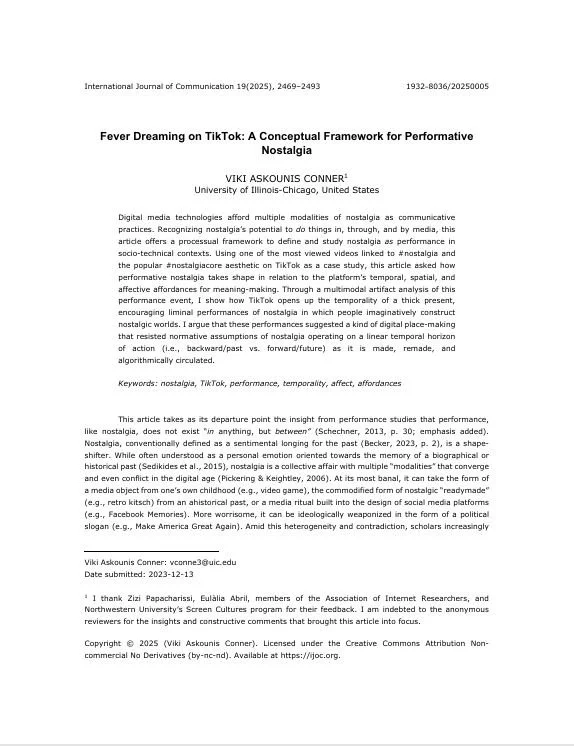Publications
-

Conner, V. A. (2025). Fever dreaming on TikTok: A conceptual framework for performative nostalgia. International Journal of Communication, 19, 25. Retrieved from https://ijoc.org/index.php/ijoc/article/view/22560
Digital media technologies afford multiple modalities of nostalgia as communicative practices. Recognizing nostalgia’s potential to do things in, through, and by media, this article offers a processual framework to define and study nostalgia as performance in socio-technical contexts. Using one of the most viewed videos linked to #nostalgia and the popular #nostalgiacore aesthetic on TikTok as a case study, this article asked how performative nostalgia takes shape in relation to the platform’s temporal, spatial, and affective affordances for meaning-making. Through a multimodal artifact analysis of this performance event, I show how TikTok opens up the temporality of a thick present, encouraging liminal performances of nostalgia in which people imaginatively construct nostalgic worlds. I argue that these performances suggested a kind of digital place-making that resisted normative assumptions of nostalgia operating on a linear temporal horizon of action (i.e., backward/past vs. forward/future) as it is made, remade, and algorithmically circulated.
-

Rojecki, A., Conner, V. A., & Royal, P. (2024). Live Free and Die: How Social Media Amplify Populist Vaccine Resistance. Social Media + Society, 10(3). https://doi.org/10.1177/20563051241277293
The COVID-19 pandemic led to over one million American deaths, disproportionately suffered by those who resisted vaccination by championing individual autonomy over the collective good. The article takes as its point of departure that vaccine resistance is a recurring phenomenon in U.S. history with multiple origins. Among these are the absence of a consistent approach to public health policy—the combined result of the absence of federal police power—and tensions between the public good and libertarian values. The latest instance of populist resistance was assisted by changes in the information system. Relying on several lines of research, we specify a model of group identification that highlights social media’s role in this latest eruption of opposition. A key element is an attentive public that selectively shares information based on reputational concerns. We test our model by applying frame analysis on a body of data drawn from U.S.-based news content and audience reactions on Facebook.
-

Conner, V. (2020). Myths and markets: The emergence of the public policy program at the University of Chicago [Master’s thesis, University of Chicago]. https://doi.org/10.6082/uchicago.11318
This thesis details the origins of the Committee on Public Policy Studies (the present-day Harris School of Public Policy) at the University of Chicago from 1969 to 1974 as a case study in organizational emergence. Combining historical methods with a processual sociological approach, I interrogate the social processes that led to the organizational decision to move forward with the program despite limited funding and tepid faculty support owing to concerns that it challenged the University’s institutional identity and myths. By examining the intra-organizational dynamics of a university that stood at odds with the inter-organizational market pressures of the time, I offer a counterpoint to the conventional institutionalist explanation for the emergence of policy schools and argue that the Chicago decision reflected a great gamble – symbolically and financially – opened up by the flux of events during a time of great uncertainty in higher education. Filling a critical gap in the University of Chicago’s historiography, I demonstrate how the new policy program ultimately resulted in the replication of the University’s intellectual tradition while at the same time introducing the possibility for organizational transformation by synthesizing the paradoxical logics of its myths with the market. In doing so, this thesis serves as both a cautionary tale about the power of myths and a hopeful tale about the possibilities for new markets for contemporary universities as they face, once again, extraordinary financial challenges and social unrest.

Research Spotlight
Performative Nostalgia
“While nostalgia is often defined in object-centric terms and normatively evaluated based on its content or temporal orientation, the concept of performative nostalgia shifts emphasis from the what of nostalgia (i.e., affective valence/mood or representational form/mode) to how its modalities come together in particular socio-technical contexts to generate meaning and possibilities for action for subjects.” (Conner, 2025, p. 19)
“Ultimately, this article enriches current practice theory-based accounts of nostalgia and digital media by conceptualizing nostalgia as performance, not just a resource used in performance, to illuminate the interlinkages between what might otherwise be understood as disparate—if not contradictory—modalities of nostalgia.” (Conner, 2025, p. 3)
